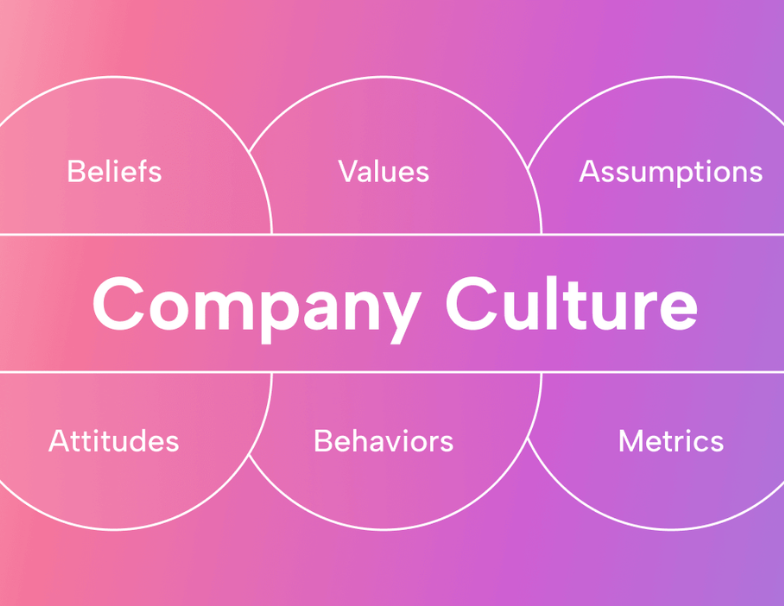Top Tips for Creating a Positive Culture at Work

Creating a positive culture at work leads to higher employee satisfaction, retention, and productivity. This article will provide practical strategies to help you cultivate an engaging and supportive workplace environment. From understanding the core elements of positive culture to actionable steps you can implement today, we cover everything you need to know.
Key Takeaways
- A positive workplace culture enhances employee satisfaction, loyalty, and productivity through shared values and supportive practices.
- Key factors affecting company culture include leadership style, employee feedback, and clear communication, all contributing to fostering an inclusive and engaging environment.
- Implementing recognition programs, flexible work arrangements, and professional development opportunities are essential for creating a motivating and positive work culture.
Understanding Positive Workplace Culture

Positive workplace culture is defined as a set of values, attitudes, and practices that guide how employees interact with one another and with the organization as a whole. Core elements of workplace culture include shared beliefs and behaviors that shape the dynamics within the organization. When employees share a common purpose and align their behaviors with business goals, it creates a cohesive environment where everyone is working towards the same objectives, reflecting the company’s culture and diverse work cultures. Additionally, workplace culture impacts overall employee satisfaction and productivity.
A positive culture promotes loyalty and motivation among employees, driving them to achieve common goals. It is crucial for improving company performance and driving financial success. Creating a positive culture sustains employee engagement, reduces turnover, and makes employees feel valued and appreciated. When employees are happy and satisfied, they are more productive and loyal to the company, fostering positive cultures.
Supportive cultures foster higher morale and job satisfaction by making employees feel valued. This leads to increased employee happiness, which in turn enhances productivity and loyalty. Nurturing these core elements helps businesses create a positive work culture and fulfilling work cultures, benefiting both the organization and its employees.
Key Factors Affecting Company Culture
Leadership style significantly impacts workplace interactions by fostering trust and engagement among employees. Effective empathetic leaders balance the needs of their employees with organizational objectives, creating a supportive and motivating environment. Ethical standards guide employee behavior and decision-making, shaping a culture of leadership team’s trust and integrity.
Employee feedback shapes and enhances company culture and can also affect company culture over time. Regularly collecting feedback helps identify and resolve issues before they escalate, giving employees a sense of value and ownership. A culture of recognition leads to more engaged and loyal employees, increasing performance and motivation. Celebrating both major achievements and small wins can strengthen the sense of purpose among employees and improve company culture, ultimately enhancing the employee experience.
Fostering a sense of belonging within teams can lead to higher levels of employee engagement and satisfaction. Promoting employee autonomy encourages creativity and ownership, leading to higher job satisfaction. An adaptable culture prepares employees to handle change with confidence, enhancing resilience and motivation. Focusing on these key factors affect company culture helps businesses create a positive workplace culture that supports organizational success.
Establish Clear Company Values
Core values define an organization’s core values and should reflect what is important to both the company’s core values and its people. Defining core values aids in establishing a concise list that reflects the company’s culture and goals. Once established, these values should be incorporated into all company operations, including hiring, customer interactions, and employee assessments to ensure consistency and alignment.
Leaders play a critical role in exemplifying these values to foster a cohesive work environment. Alignment of core values with daily practices creates a strong organizational culture where company leadership helps ensure that employees feel valued and motivated.
Well-defined core values lead to higher employee satisfaction as personal values align with the company culture. Establishing and adhering to clear company values helps create a positive work culture that resonates with employees.
Promote Open Communication

Transparency in organizational goals fosters trust among employees, leading to enhanced team spirit and productivity. When employees understand the company’s objectives, they are more likely to feel engaged and motivated in their work. Open communication encourages employees to express ideas and concerns without fear, fostering trust and collaboration. Regular updates on progress toward organizational goals can help maintain focus and accountability within teams.
Empathetic leaders actively communicate, often sharing personal experiences to connect with their teams. Psychological safety allows employees to voice concerns or ideas without fear of negative consequences. Leaders should model open communication by actively listening and being approachable, setting a positive example for the team. Promoting open communication creates a positive work environment where employees feel heard and valued.
Encourage Collaboration and Inclusivity

A culture of diversity and inclusion fosters innovation and collaboration by valuing a range of perspectives. Fostering a sense of belonging within the workplace significantly improves employee retention. Encouraging proactive communication about inclusion can enhance the overall workplace culture and promote inclusive language. Leaders should model inclusive behavior to establish a safe and welcoming environment for all employees.
Inclusive workplace practices should focus on everyday interactions to enhance employee connections. Peer recognition can be equally meaningful and can help reinforce desired behaviors in the workplace. Encouraging collaboration and inclusivity helps create a positive work culture that promotes employee engagement and satisfaction.
Recognize Employee Efforts
Recognizing and rewarding employees boosts morale and reinforces positive behaviors, strengthening company culture. Acknowledging employees’ achievements boosts morale and engagement. Recognition not only encourages high performance but also makes employees feel valued. Timely and specific recognition is more impactful, encouraging continued strong performance.
Employee recognition can be implemented through verbal acknowledgment and a rewards system. Recognizing employees efforts fosters friendly competition and increases performance. Receiving recognition increases motivation and engagement among employees. Creating an employee recognition program encourages high performance and motivates peers.
Utilizing real-time feedback tools, such as AI-powered sentiment analysis tools, can facilitate immediate responses to employee concerns, improving overall morale. Recognizing and celebrating employee efforts helps create a positive workplace culture that motivates and retains top talent and encourage employees, leading to improved employee relationships.
Offer Flexibility
Flexibility in the workplace is increasingly valued by employees, especially post-pandemic. Offering flexibility in work arrangements demonstrates a company’s commitment to employee well-being, enhancing loyalty and satisfaction. Flexible work arrangements allow employees to manage personal appointments without taking leave, contributing to a better work-life balance.
Flexible work arrangements can lead to reduced employee turnover and absenteeism. Flexibility in work scheduling contributes to improved employee health and well-being. Remote work options can lower commuting costs and stress for employees.
Offering flexibility creates a positive work environment that supports flexible employees’ well-being and productivity, allowing employees work to thrive and creating a positive work environment.
Provide Professional Development Opportunities
Professional development opportunities are crucial for retaining younger employees who seek growth and advancement. Professional growth opportunities cultivate employee engagement and retention. Offering growth opportunities tends to make engaged employees feel more satisfied. This increase in satisfaction leads to improved productivity as well.
Continuous learning is essential for staying competitive in a rapidly evolving job market. Engaging in professional development increases employees’ confidence and enhances their credibility. Networking events associated with professional development can create valuable career connections.
Offering professional development opportunities helps create a positive workplace culture that supports employee growth and employee development.
Plan Social Outings and Team-Building Activities

Team collaboration and social interactions contribute to a supportive environment and improve overall morale. Work outings significantly enhance team bonding by providing enjoyable experiences outside of the typical work environment. Engaging in activities like escape rooms can promote teamwork and collaborative problem-solving among employees.
Cooking classes as team outings encourage collaboration and can foster a sense of achievement among participants. Volunteering together can strengthen relationships and create a sense of shared purpose among team members.
Organizing picnics or outdoor events provides a relaxed atmosphere where employees can socialize and build connections. Plan social outings humans and team-building activities helps create a positive work environment that fosters teamwork and camaraderie.
Implement a Zero-Tolerance Policy
Under the Equality Act 2010, employers have a legal responsibility to protect employees from harassment and discrimination. A strict zero-tolerance policy ensures all allegations of misconduct are treated with seriousness and confidentiality.
Such policies, supported by strong leadership and clear communication, help combat toxic behavior and promote a safe, respectful workplace.
Utilize Employee Feedback

Employee feedback is crucial for cultivating a great work experience. Gathering feedback identifies and resolves issues, giving employees a sense of value and ownership. Organizations should take employee feedback into account for cultivating a positive company culture. Active listening to employee suggestions fosters a sense of ownership and accountability among team members.
Regular recognition helps employees understand that their contributions are valued, enhancing their loyalty to the company. Utilizing real-time feedback tools can facilitate immediate responses to employee concerns, improving overall morale. Utilizing employee feedback helps create a positive workplace culture that empowers employees and fosters engagement.
Lead with Compassion
Empathy in the workplace makes employees feel acknowledged and valued. Compassionate leaders lead to employees feeling respected and believing the company cares about them. Supported and appreciated employees tend to be more loyal. Managers in positive company cultures exhibit kindness and empathy.
Listening to employees’ emotional cues is vital for leaders to understand deeper concerns and foster dialogue. Hands-on training is necessary for managers to promote a positive workplace. Leading with compassion helps create a positive work environment that fosters trust and loyalty among employees.
Be Transparent About Organizational Goals
Clearly communicating long-term objectives aligns employees with the company mission and success. When employees understand the organization’s goals, they are more likely to feel connected and valued in their roles. Clarity on goals helps cultivate a sense of professional purpose among employees.
Open communication about organizational goals fosters trust and engagement among employees. Transparency about organizational goals helps create a positive work culture that supports employee engagement and drives business success, allowing the organization thrive.
Summary
Creating a positive workplace culture involves a multifaceted approach that includes establishing clear company values, promoting open communication, recognizing employee efforts, and offering flexibility. Each of these elements contributes to a supportive and engaging work environment where employees feel valued and motivated.
Companies like Offsite make this possible by organizing meaningful team retreats that foster deeper connections, promote open communication, and reinforce company values—helping businesses build a positive work culture that boosts productivity, enhances employee satisfaction, and drives overall success. A thriving workplace culture not only benefits employees but also drives business growth and innovation. Let’s commit to creating workplaces where everyone can thrive and succeed together.
FAQs
- Why is positive workplace culture important?
Positive workplace culture is essential because it enhances employee engagement and satisfaction, driving productivity and ultimately contributing to the company's financial success.
- How do you establish clear company values?
To establish clear company values, define core values that align with your culture and goals, integrate them into all operations, and ensure that leadership exemplifies these values consistently. This approach fosters alignment and commitment across the organization.
- What are the benefits of open communication in the workplace?
Open communication in the workplace fosters trust and collaboration, making employees feel valued and leading to improved morale and productivity. This creates a more engaged and effective team environment.
- Why is recognizing employee efforts important?
Recognizing employee efforts is crucial as it boosts morale and reinforces positive behaviors, making employees feel valued and engaged. This appreciation ultimately encourages high performance within the organization.
You may also like
Unique spaces for your next offsite
Find distinctive venues for your upcoming corporate retreat.
Stay Updated with Our Insights
Get exclusive content and valuable updates directly to you.







